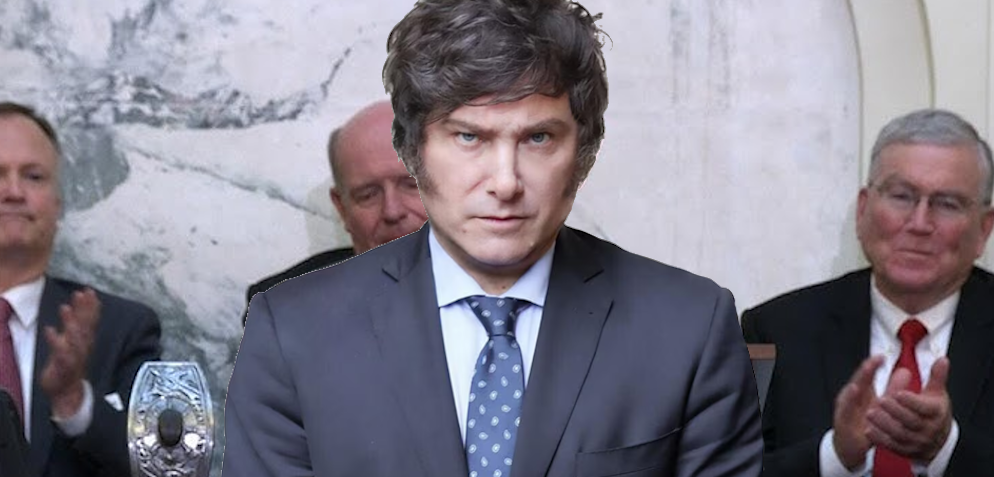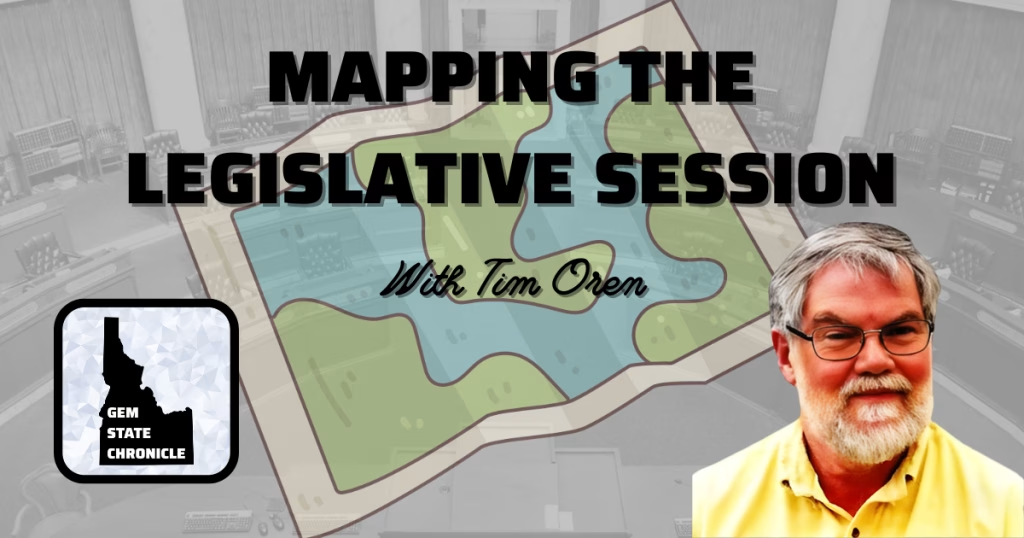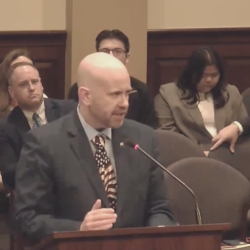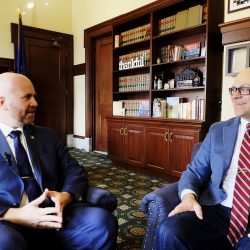It’s in the nature of government to expand. Once bureaus and bureaucrats get a taste of power, they begin to believe they know better how to manage citizens than the citizens themselves. When economic downturns occur, governments are incentivized to try to fix things, as if the economy were a car engine in need of a tune-up. Franklin Roosevelt set that precedent during the Great Depression. Despite the economy being worse by many measures in 1936 than it was in 1932, the American people overwhelmingly reelected FDR simply because he appeared to be “doing something.”
Often, doing nothing is the proper course. Calvin Coolidge, who was president during the 1920s before the Depression, responded to his own economic downturn by cutting government spending and laying off federal employees. The downturn quickly passed, and the country recovered. FDR’s New Deal, by contrast, severely exacerbated the situation, prolonging what could have been a short, intense panic into a decade-long, nation-altering crisis.
The United States wasn’t the only country to fall for the temptation of letting government micromanage the economy. Argentina turned to the soft socialism of Juan Perón in the 1940s, a path that led the once-prosperous nation into poverty. No matter how bad things got, socialist leaders saw it as a mandate to micromanage even more—to increase regulations and ramp up government spending—until the country was in dire straits by the 21st century.
In 2005, Argentina was forced to declare bankruptcy under the weight of $95 billion in debt. The years of restructuring and litigation that followed hampered its ability to participate in the global economy. Later, President Cristina Fernández de Kirchner imposed price controls and nationalized the country’s largest energy company—moves that, predictably, worsened the situation.
In 2023, the Argentine people elected a radical libertarian, Javier Milei, who promised sweeping cuts to government spending and regulation. In a viral campaign video, Milei listed the government departments he would eliminate if elected, shouting “¡afuera!” (“out!”) after each one.
Progressives and socialists in the media and think tanks were aghast, warning that electing Milei would make things even worse. Yet the opposite has proven true—predictably so, for those who live in a rational world instead of a Leninist fantasy. Argentina’s inflation rate, which had been over 25% per month, has fallen below 1.5% less than two years after Milei took office. That’s even better than our own country.
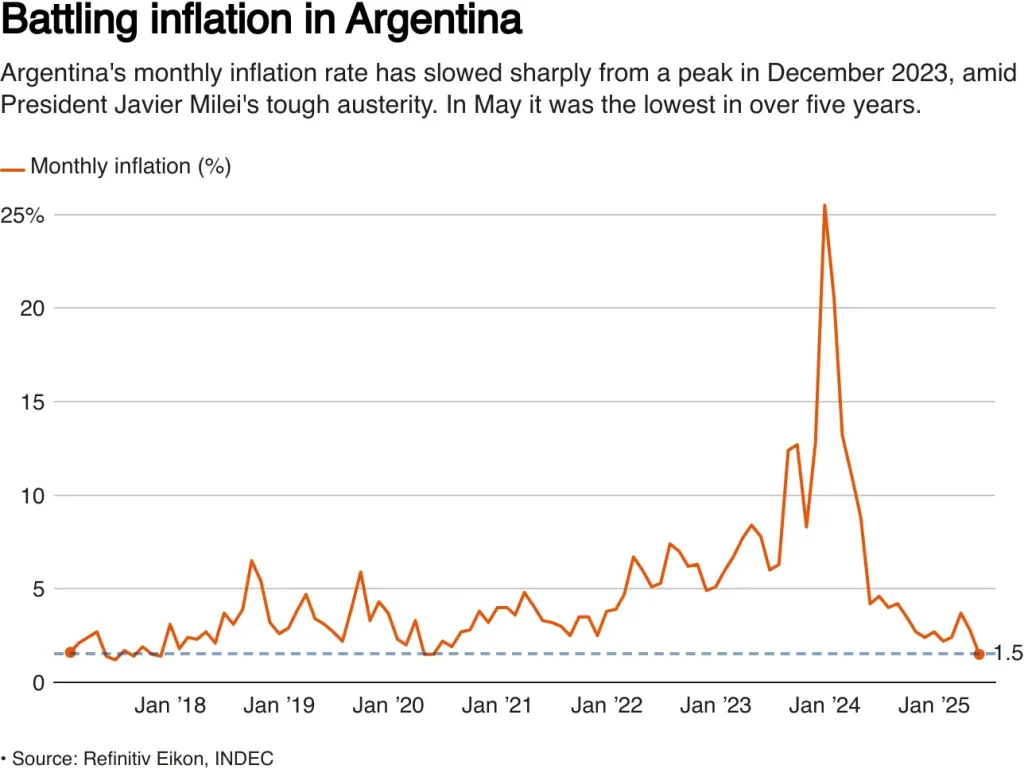
Milei has kept his promises to shrink government: reducing spending, eliminating entire departments, laying off government workers, and—according to the libertarian Cato Institute—slashing an average of two regulations per day since taking office. He is an unqualified success story for free-market economics and personal freedom.
Ron Nate, president of the Idaho Freedom Foundation (IFF), recently asked, “Who is Idaho’s Javier Milei?” He suggested that the only thing stopping a Milei-type figure from promising major cuts to spending and regulation in Idaho is a lack of courage:
Recent history shows that such a chainsaw patriot would win elections and reelections in landslides. So, it shouldn’t take courage to do what is both right and popular, should it? Well, the fact that it hasn’t been done indicates cowardice because our leaders are afraid of something. They must be afraid of special interests, powerful agencies, and liberal media more than they are concerned about doing what’s right for the people.
As I wrote yesterday, we should begin identifying specific government agencies that don’t need to exist and preparing legislation to dismantle them. The same goes for spending—activists and elected officials should be poring over budgets right now, identifying specific line items that can be zeroed out. However, I’m not entirely convinced that a “chainsaw patriot” would win in a landslide in Idaho. Outside a certain conservative/libertarian bubble, few voters seem to care about spending for its own sake.
I also suspect most voters care less about the level of spending in general than about what that money is being spent on. It’s easy to say government spending is too high (and it is—don’t get me wrong), but ask the average Idaho voter what they would cut, and things get murkier. Cutting law enforcement is not popular, nor is reducing transportation infrastructure spending. Anyone who even hints at cutting public school funding is lambasted in the press. Democrats continue to insist we’re not spending enough—despite billions of additional dollars for public education in just the past few years.
I think most conservatives agree that we spend too much on Medicaid, especially when benefits go to able-bodied, working-age adults. But any attempt to place guardrails on the program is met with loud protests, and lawmakers are told they’ll be responsible for countless deaths. So yes, cutting even obviously bloated programs does require courage.
Still, the biggest reason we haven’t seen a Javier Milei in Idaho is that Idaho isn’t Argentina. Americans panicked when inflation topped 9% during the Biden administration, but it has currently settled down to a much more tolerable 2.4%. In contrast, Argentina faced 25% monthly inflation before Milei took office.
Milei had the unenviable task of fixing a nation warped by socialism for the better part of a century. But that also meant his country had hit rock bottom. Not only were voters willing to elect someone considered radical, there was plenty of low-hanging fruit for Milei to cut with his metaphorical chainsaw.
Idaho is in a very different place. On the same day Ron Nate published his article, Gov. Brad Little issued a press release celebrating Idaho’s booming economy. Tax revenues, gross domestic product, and personal income are all up, while unemployment has dropped to 3.6%. While we can quibble with some of the numbers, the truth is that Idaho is doing fairly well. Why would voters overwhelmingly support someone seen as fiscally radical when the status quo seems to be working?
Earlier this year, I wrote about how Gov. Little has charted a successful political path by not upsetting the status quo. He seems to have calculated that as long as the economy remains solid, most voters will continue to support his leadership. Like it or not, I believe he’s right. A strong economy has allowed him to have his cake and eat it too—signing hundreds of millions of dollars in tax cuts into law while steadily increasing government spending beyond the rate of inflation and population growth.
Indeed, Ed Humphreys’ 2022 gubernatorial campaign, in some ways, prefigured Javier Milei’s by promising to significantly cut government. If Idaho voters had simply been waiting for a leader with that message, then Humphreys would have won that election.
I believe that until things get worse, most voters, as well as their elected representatives, will stick with the current trajectory. That’s not a normative statement—I’m not saying this is a good thing—it’s just the way I see the situation. Personally, I think we should make hay while the sun is shining. We should be working now to cut spending and roll back government growth, rather than waiting until another recession forces our hand. I’m sure Ron Nate would agree.
Original appropriations in Idaho have grown massively over the past decade, with the biggest jumps coming during the pandemic, when the federal government spent money like a drunken sailor trying to stave off collapse. From FY 2021 to FY 2022 alone, spending increased by 20%. Over the last ten years, it has nearly doubled:

I’d rather Idaho never reach the nadir that Argentina saw in the 21st century. Yet we cannot continue expanding government indefinitely. As I said yesterday: let’s get specific. Take time to read through the sine die budget packet and see how your legislators are appropriating your tax dollars. Use Transparent Idaho to understand how state agencies are spending that money. Contact your legislators, especially those on the Joint Finance-Appropriations Committee, and urge them to set a goal of actually cutting total spending next year, not just slowing its growth. Help them out by coming to them with specific programs and line items that should be done away with.
I’m not sure we will see a Javier Milei in Idaho, but maybe we don’t need one. Let’s keep the pressure on our legislators to rein in government spending now, so we never have to climb out of the hole that Argentina, at long last, is starting to escape.
Gem State Chronicle is a reader-supported publication. To receive new posts and support my work, consider becoming a free or paid subscriber.
About Brian Almon
Brian Almon is the Editor of the Gem State Chronicle. He also serves as Chairman of the District 14 Republican Party and is a trustee of the Eagle Public Library Board. He lives with his wife and five children in Eagle.


